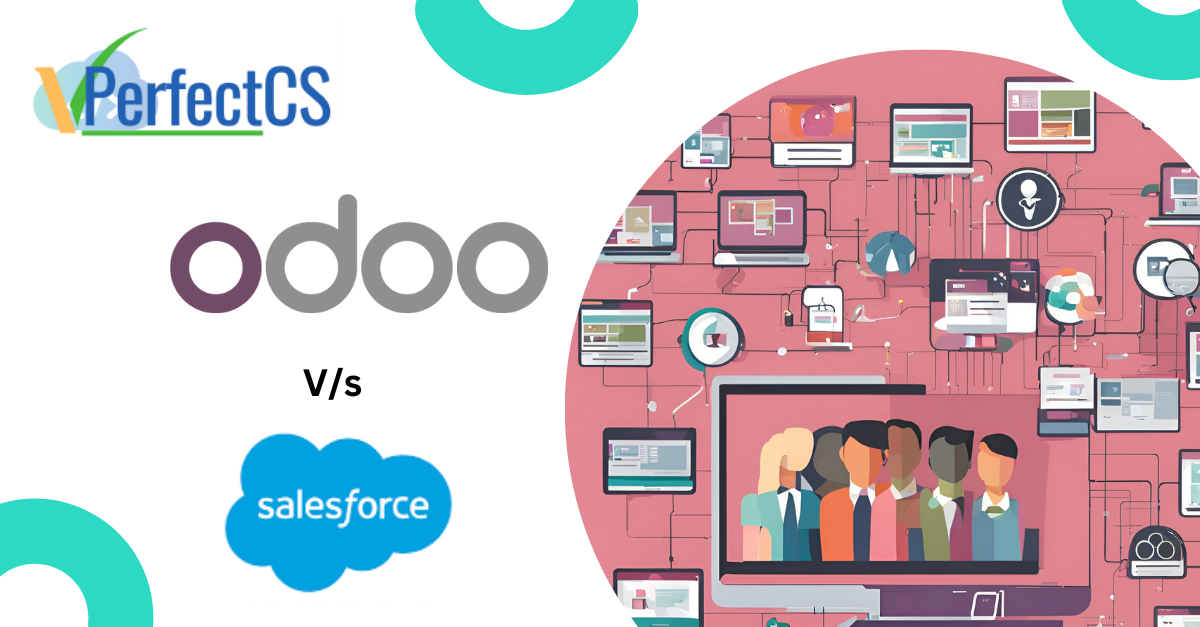"Decoding the Right CRM for Your Business: A Comprehensive Comparison of Odoo and Salesforce"
In today’s fast-paced business landscape, effective Customer Relationship Management (CRM) is crucial for business success. CRM systems are more than just software; they are essential tools that help businesses organize customer data, manage interactions, and enhance sales workflows. As companies strive to enhance their customer interactions and streamline operations, the choice of CRM software can significantly impact their performance. This leads us to a critical question: Odoo or Salesforce?

When choosing between Odoo and Salesforce for customer relationship management, it’s essential to understand the nuances of each platform. Below is a comprehensive comparison focusing on key aspects such as pricing, features, usability, and more.
1. Overview:
Odoo
- Founded: 2005
- Type: ERP with integrated CRM
- Target Users: Small to medium-sized Enterprise businesses (SMEs)
- Strengths: Cost-effective, extensive customization, and a wide range of integrated applications.
Salesforce
- Founded: 1999
- Type: Dedicated CRM platform
- Target Users: Businesses of all sizes, particularly larger enterprises
- Strengths: Established market leader, extensive features, and robust analytics capabilities.
2. Pricing Structures:
Structure |
| Salesforce |
Pricing | Free Community Edition for One App Free Plan and others with a nominal cost, Paid Enterprise Edition. | Essentials, Professional, Enterprise, Unlimited with each category having their own pricing plans. |
Cost | Free Community Edition, Enterprise Edition price depends on apps and users, and services opted. | Essentials: $25/month/user, Professional: $75/month/user, Enterprise: $150/month/user, Unlimited: $300/month/user |
Other Costs | Integrating paid apps into Community Edition costs extra | Annual billing plus additional costs for integrations |
3. Core Features Comparison
Feature | Odoo | Salesforce |
Information Storage | Cloud-based, Customizable Form Fields | Cloud-based, Extensive Contact Management |
Task Management | Kanban View, Customizable Pipeline, Activity Management | Kanban View, Advanced Task Management |
Team Management | Sales Teams Management, Team Calendars, Lead Assignment | Sales Teams Management, Gamification |
Customer Communication | Email Integration, Email Marketing and Campaigns, Email Templates,VoIP Integration, live chat | Email templates, VoIP Integration |
Lead Generation | Website Leads, Event Registrations, Lead Enrichment, lead Mining, Predictive Lead Scoring and Contact List Import? Export | Campaign Tracking, Third-Party Integrations |
Sales Management | Quotation Templates, Invoice Management | Advanced Quoting, Sales Forecasting |
Reporting & Analytics | Customizable Reports and Dashboards, Pivot Tables | Comprehensive Analytics, Forecasting Reports |
Usability | Intuitive User-friendly Interface, Mobile App | Feature-rich Interface, Mobile App |
Integrations | Wide range of in-house and community apps | Extensive third-party integrations |
4.User Experience:
Odoo:
Uses a colorful interface that categorizes information clearly, making it user-friendly, especially for new users.
- The mobile app is well-optimized for on-the-go access.
Salesforce:
- Maintains a consistent blue theme, which is visually appealing but may feel complex due to the abundance of features.
- The mobile app offers comprehensive functionalities but may overwhelm new users.
Customization and Flexibility:
Odoo:
Offers extensive customization options due to its open-source nature. Businesses can adapt the software to meet specific needs without incurring heavy costs.
Salesforce:
While customizable, many features require additional costs for third-party apps and add-ons, which can increase overall expenses.
Integration Capabilities:
Odoo:
Comes with its built-in business apps (Sales, purchase, inventory, accounting, etc.) and other necessary connectors for various applications (e.g., payment processors, shipping services) as part of the standard package.
Salesforce:
Provides a vast marketplace for third-party integrations, but many require additional fees, which can add complexity to the integration process.
Scalability:
Odoo:
Designed to grow with the business, allowing for the addition of new modules as needed without significant cost increases.
Salesforce:
Highly scalable for larger enterprises, but costs can escalate with additional users and features.
Conclusion:
Both Odoo and Salesforce are powerful CRM solutions but cater to different business needs.
Choose Odoo if:
- You are a small to medium-sized business looking for an affordable, comprehensive solution that integrates various operational needs beyond CRM.
- You value customization and ease of use.
Choose Salesforce if:
- You are part of a larger business or enterprise that requires extensive CRM capabilities and can afford the associated costs.
- You need advanced analytics and reporting features.
Odoo V/s Salesforce Comparison White Paper: Click here to Download
Ultimately, the choice between Odoo and Salesforce will depend on your specific business requirements, budget, and growth plans. Each platform has its strengths, and understanding these can help you make an informed decision.